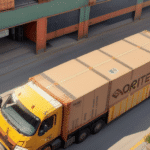Understanding the Role of an Importer of Record in the Supply Chain
International trade is a complex process that requires multiple parties to collaborate effectively to ensure successful imports and exports. A pivotal player in this process is the Importer of Record (IOR). An IOR is an individual or company responsible for ensuring that goods entering a country comply with all regulatory requirements, including taxes, duties, and customs clearance.
Why an Importer of Record is Essential for International Trade
Without an IOR, importing goods into a country can be a complicated and time-consuming endeavor. Requirements vary by country and are frequently updated, often without notice. An IOR possesses the expertise to navigate these complexities, ensuring a seamless import process. According to a 2023 Supply Chain Industry Report, businesses that utilize IOR services experience a 30% reduction in customs clearance times.
Moreover, an IOR provides valuable assistance in complying with local regulations and laws. They help importers obtain necessary permits and licenses and ensure that products meet required standards and certifications. This is particularly crucial in industries such as food and pharmaceuticals, where stringent regulations protect public health and safety.
The Legal Responsibilities of an Importer of Record
Importers are legally accountable for ensuring their products meet all regulatory requirements, including compliance with customs regulations, tariffs, and duties. Non-compliance can result in severe legal and financial consequences, such as fines or seizure of goods. An IOR assumes the legal responsibility of correctly classifying and valuing goods and ensuring all necessary documentation is in order.
Additionally, IORs must adhere to safety and environmental regulations, ensuring that products do not contain hazardous materials and are properly labeled with necessary warnings. Failure to comply can lead to significant legal and reputational damage.
Accurate record-keeping is also a critical responsibility of IORs. They maintain detailed records of imports and exports, including the quantity, value, origin of goods, and any applicable taxes and fees paid. These records must be retained for specified periods and made available to customs officials upon request.
The Benefits of Hiring an Importer of Record
Partnering with an IOR offers numerous advantages:
- Time and Effort Savings: IORs handle the intricate logistics of the import process, allowing businesses to focus on their core operations.
- Expertise and Resources: IORs possess specialized knowledge and resources, enabling them to effectively manage regulatory bodies and ensure compliance.
- Cost Reduction: IORs can minimize import duties and other related expenses through optimized processes and negotiations.
Additionally, hiring an IOR provides greater flexibility and scalability. As businesses expand, the import process becomes more complex. An IOR allows businesses to scale their import operations seamlessly without the additional burden of managing logistics and compliance requirements.
How an Importer of Record Manages Customs Clearance
Customs clearance is a critical component of the import process, and an IOR plays a vital role in its success. The IOR submits all necessary paperwork to customs officials and manages the clearance process, ensuring products are correctly classified and valued, and that all taxes and duties are paid.
Staying updated with the latest customs regulations and requirements is a key responsibility of an IOR. This includes understanding changes to tariffs, trade agreements, and import/export laws. According to the Global Trade Compliance Report 2023, up-to-date knowledge of customs regulations can reduce clearance delays by up to 25%.
Beyond customs clearance, IORs may also offer additional services such as transportation and warehousing. By providing a comprehensive range of logistics services, IORs help streamline the supply chain and reduce overall costs, particularly benefiting businesses new to importing.
The Role of an Importer of Record in Managing Tariffs and Duties
The IOR handles the payment of all tariffs and duties associated with imported goods. This involves identifying applicable charges and calculating the total amount due. Furthermore, IORs collaborate with customs officials to ensure all requirements are met for legal importation.
In addition to managing tariffs and duties, IORs ensure that imported goods comply with relevant regulations and standards. This includes verifying that products meet safety and quality standards and any specific industry or product requirements. IORs may also be responsible for obtaining necessary licenses or permits for importing goods.
Ensuring Compliance with Regulations through an Importer of Record
An IOR serves as a regulatory compliance expert, guiding importers through the intricate web of laws and regulations related to the import process. With regulations constantly evolving, an IOR stays informed of these changes to ensure ongoing compliance. This includes adhering to regulatory requirements related to product specifications, labeling, and packaging.
Ensuring all necessary documentation is accurate and timely is another critical role of an IOR. This includes obtaining required permits and licenses and completing all customs paperwork correctly. Non-compliance with documentation requirements can lead to delays, fines, and even seizure of goods.
Furthermore, IORs assist importers in navigating the complexities of customs clearance, working with customs officials to resolve issues such as inspections or disputes over product classification. The expertise of an IOR helps avoid costly delays and ensures goods are cleared for entry swiftly and efficiently.
Common Challenges Faced by Importers of Record and How to Overcome Them
Importers of Record often encounter several challenges, including:
- Regulatory Compliance: Managing compliance with complex and ever-changing regulations can be daunting. Partnering with an experienced IOR who has in-depth knowledge of regulatory requirements is essential to overcoming this challenge.
- Cost Management: Handling tariffs and duties efficiently is critical to managing costs. An IOR can help minimize expenses related to customs clearance and compliance, thereby controlling overall import costs.
Factors to Consider When Choosing an Importer of Record
When selecting an IOR, consider the following factors:
- Regulatory Expertise: The IOR should have a comprehensive understanding of the regulatory requirements in the destination country.
- Experience: Experience in managing the import process for your specific products is crucial.
- References: Reliable IORs should be able to provide references from satisfied clients.
- Communication and Responsiveness: Effective communication is vital. Choose an IOR who is available to address any questions or concerns promptly.
- Cost: While cost is an important factor, prioritize quality and reliability over the lowest price. Investing in a reputable IOR can prevent costly mistakes and delays.
The Future of the Importer of Record in the Supply Chain Industry
The role of the IOR is becoming increasingly vital as global trade continues to expand. Technological advancements and automation have enhanced the efficiency of the import process, but regulatory complexities remain a significant challenge. The importance of IORs is expected to grow, with their expertise becoming even more crucial in ensuring successful international trade.
One of the key challenges facing IORs is the constantly evolving regulatory landscape. With new regulations and trade policies being introduced regularly, it is challenging for importers to stay abreast of the latest requirements. IORs play a critical role in helping importers remain compliant by leveraging their up-to-date knowledge and expertise.
Another emerging trend is the increasing focus on sustainability and ethical sourcing. As consumers become more conscious of the environmental and social impacts of their purchases, importers must ensure that their supply chains are transparent and responsible. IORs can assist by verifying the sustainability and ethical practices of suppliers and ensuring that products meet necessary standards and certifications.
To learn more about optimizing your import process, visit our services page or contact our team of experts.




















